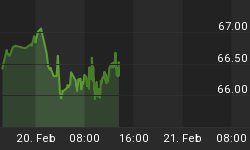The euro hit a valley recently as it traded traded as low as $1.2618 on Friday. Lackluster performance of the euro is partly to blame on vigorous US data. Such data will likely lead to the Federal Reserve maintaining its course of monetary tightening. Higher rates will continue to increase the appetite of foreign investors for dollar-denominated assets. By reaching a seven-month high against the euro as well as outshining sterling and the franc, the dollar is on a pedestal suggesting the US economy is on favorable ground. But for just how long will this situation last? The dollar performed poorly against three major currencies for the last three years. Could this be a preliminary upswing?
The market did not react much to data showing US import prices grew by 0.8 percent in April exceeding analyst forecasts. Nevertheless, the greenback reached several pips above 107 yen and then hit a shortlived plateau. Hedge fund managers will most likely be keeping an eye on the value of their precious metal baskets. The price of gold has been inversely proportional to the dollar for the last several years. When the greenback rises, gold prices tend to drop. Thursday's release of the University of Michigan consumer sentiment index, from April's value of 87.7 to May's value of 85.3, had only a minor effect on the greenback. Combined with a reduced US trade deficit in March, strong US retails sales as well as last week's jobs report appear to be leading to a solid US dollar. But again, the question remains as to how long will this last or if it will become a trend.
North Korea's Foreign Ministry declared on Wednesday that its nation had removed 8000 spent fuel rods from an old nuclear reactor successfully. Plutonium could potentially be extracted from such rods to make nuclear bombs. There is intense speculation that North Korea could conduct a nuclear test shortly. US satellites have detected features in North Korea indicative of a potential nuclear test. Such a test might send Asian currencies, including the yen, tumbling down. Against the yen, the dollar may find even more support from such nuclear testing. Indeed, against the euro, the yen may fall as well.
China's central bank announced on Wednesday that it did not change its renminbi policy subsequent to a report in one of China's top newspapers predicting a yuan revaluation by next week. The People's Daily newspaper (of China) stated itself that the article on its website was actually a translation of a story featured during the weekend. Nevertheless, the greenback dropped against the yen as the news spread throughout trading circles. China's renminbi is currently held within a band between 8.2760 and 8.2800 per dollar and speculation has been ramping up recently on expectations of an imminent revaluation.
Currency traders and investors alike were surprised at the contraction in the US trade deficit numbers for March announced Wednesday. The American currency rose against the yen to 105.75, while the euro fell against the dollar to $1.2793 immediately after the data was released, considerably lower than the earlier $1.2873. America's trade deficit shrank to $54.99 billion in March from $60.57 billion in February. Wednesday's data was considerably below analysts' and economists' predictions for above $60 billion. The dollar garnered most of its weakness against other major currencies throughout the last three years from the trade deficit.
On Tuesday, traders hedged their bets in anticipation of US trade data. Analysts expected data to show a record US trade deficit in March. Hedging led to a drop in the dollar against several other currencies. This is a swift change considering the previous strength with which the greenback had been traded. Support for the dollar came earlier from a solid US employment report released on Friday. The report released on Wednesday was expected to show a wide trade deficit in March.
Some analysts predict US rates may reach 4 percent by the end of 2005. Also, countries such as South Korea have announced that they have not planned any future diversification efforts outside of dollar-denominated assets for the near future.
China will commence trading of eight foreign currency pairs on May 18. External analysts are speculating a Chinese renminbi revaluation around that time potentially boosting the Japanese yen as well as other Asian currencies.
Fitch Ratings lifted its outlook on Japan's economy by revising its credit rating on Monday from "negative" to "stable". Finance Minister of Japan Sadakazu Tanigaki said this renewed rating reflected Japan's progress on structural reforms. Although this revised rating shows progress for the economy of the Land of the Rising Sun, it is still the lowest rated among the G7 nations. Japan has considerable public debt, as does the United States. The rating led to a rise of around 10 pips for the yen against the dollar leading to 105.25 from 105.35 yen. Bank of Japan Governor Toshihiko Fukui suggested Japan may abandon the lax zero percent interest rate policy in the future, but that it would take some time.
















